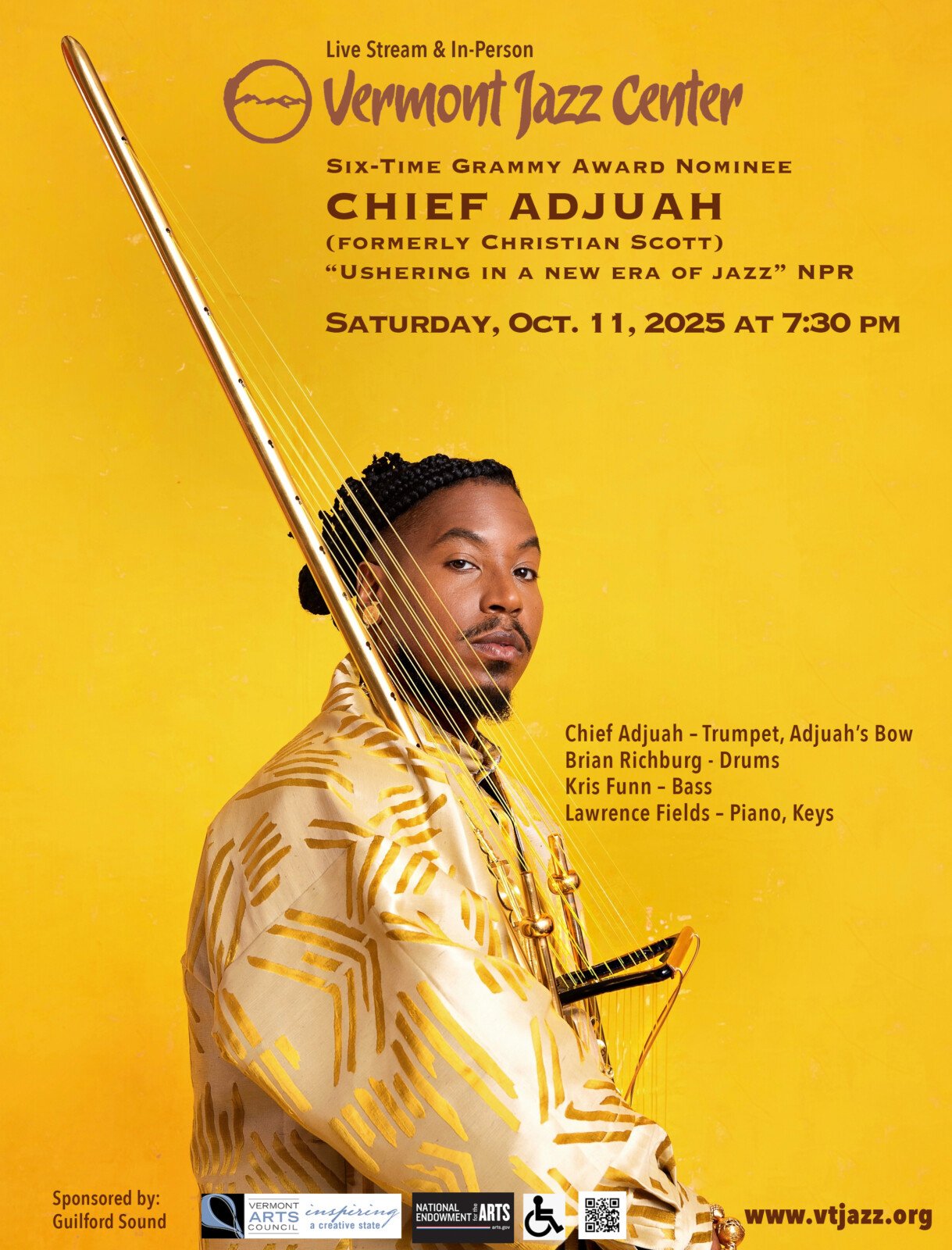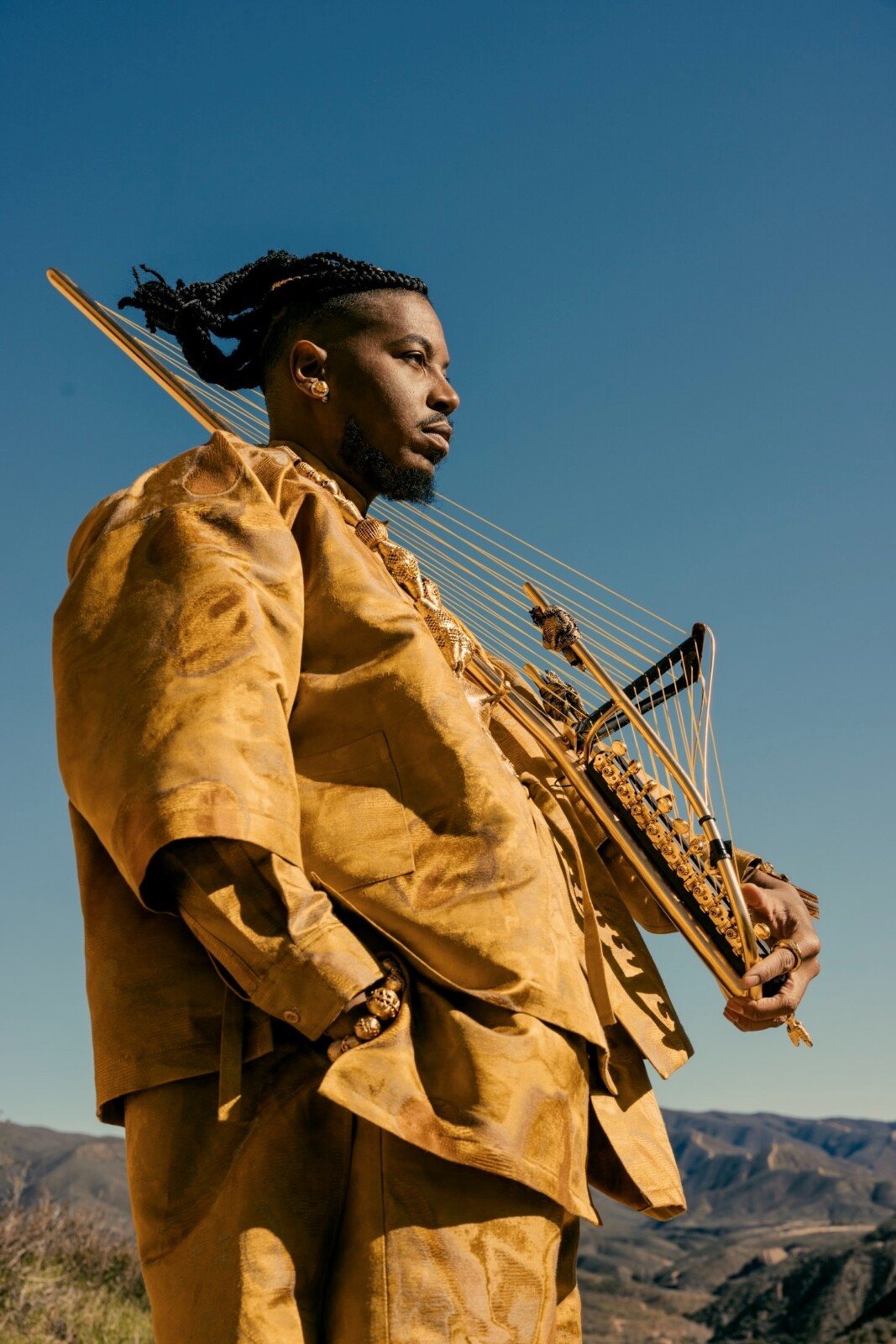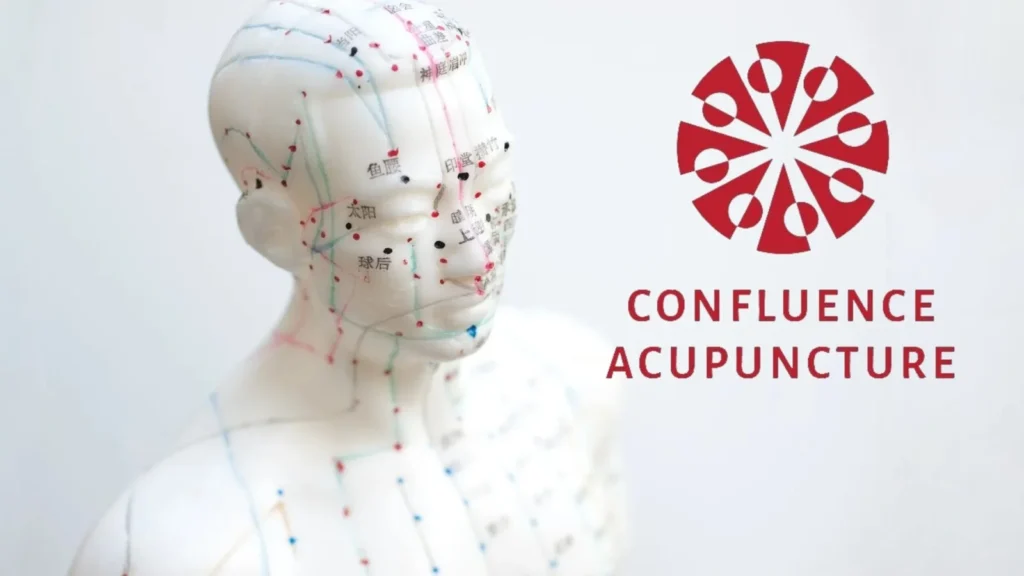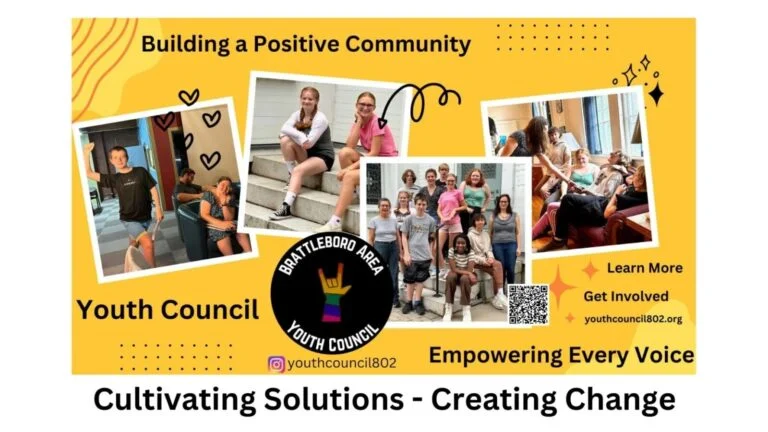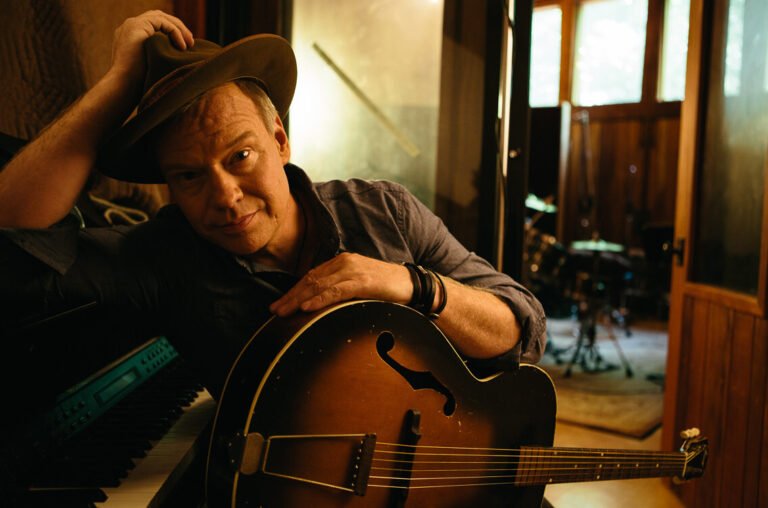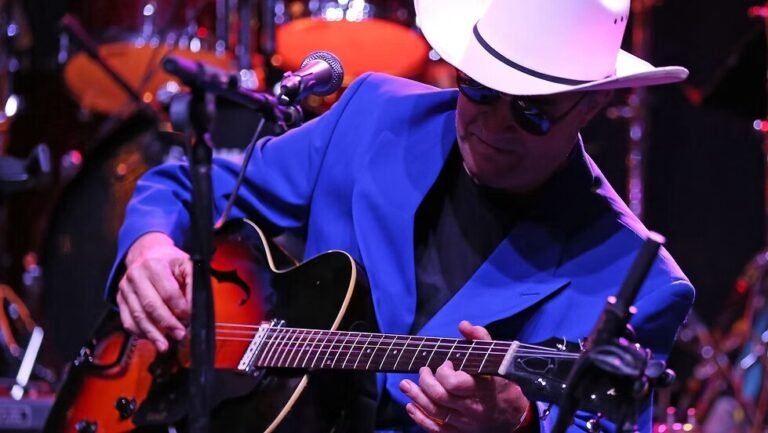On Saturday, October 11, 2025, at 7:30 PM, the Vermont Jazz Center (VJC) welcomes Chief Xian aTunde Adjuah—formerly known as Christian Scott—for an evening that promises to transcend musical boundaries. The concert will be presented both in-person in Brattleboro and livestreamed worldwide, extending the reach of one of today’s most innovative cultural voices.
Joining Chief Adjuah will be Lawrence Fields (Fender Rhodes and keyboards), Kris Funn (bass), and Brian Richburg Jr. (drums and percussion)—musicians who, like Adjuah, move fluidly between traditions while keeping improvisation at the core. Together, they form a band as versatile as the music they create, weaving a sound rooted in New Orleans while embracing global rhythms and modern sensibilities.
From Christian Scott to Chief Xian aTunde Adjuah
Born and raised in New Orleans, Chief Xian aTunde Adjuah is more than a Grammy-nominated trumpeter. He is the Grand Griot of New Orleans, custodian of its stories, and a chieftain of the Xodokan Nation, one of the city’s historic Maroon societies. His decision to change his name from Christian Scott to Chief Xian aTunde Adjuah was a reclaiming of identity—an acknowledgment of ancestral memory and resistance rooted in Afroindigenous traditions.
The Maroon communities from which Adjuah descends were formed by enslaved Africans who escaped Louisiana plantations in the 1700s. In swamps and forests, they cultivated food, built instruments, developed unique cultural expressions, and forged alliances with Indigenous peoples. Though brutally suppressed, their influence endures, most visibly in the vibrant Black Masking Indian (Mardi Gras Indian) traditions of New Orleans.
For Adjuah, music is inseparable from this lineage.
“When you learn the music from before it had labels, you learn the music from the perspectives of the Maroons, from the people who self-liberated,”
Stretch Music: Honoring the Past, Expanding the Future
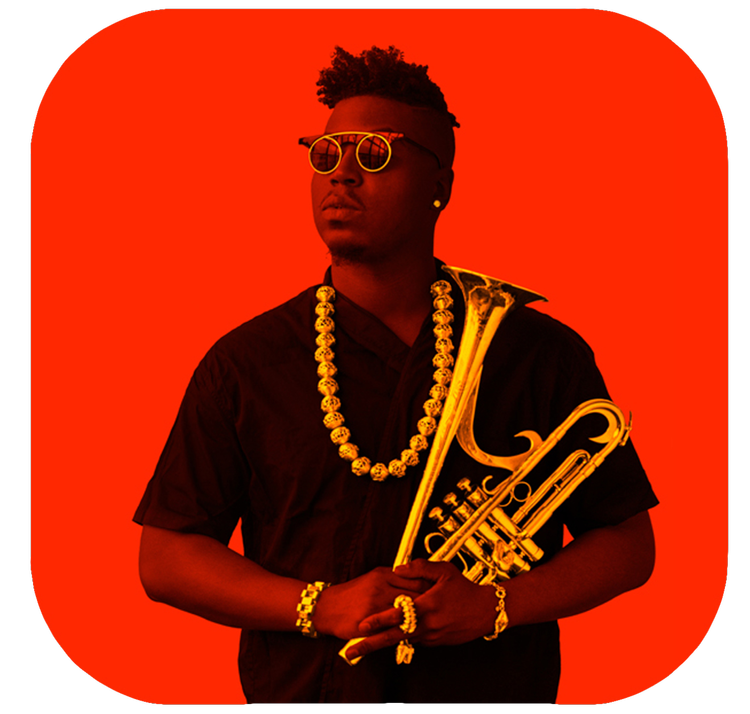
Chief Xian aTunde Adjuah calls his work “stretch music”—a form designed to stretch jazz’s harmonic, rhythmic, and melodic conventions into a space that welcomes all genres and cultures. His philosophy is genre-blind: instead of debating who is “eligible” to create jazz, stretch music invites participation, dialogue, and shared innovation.
The name itself reflects a refusal to be confined by labels. Adjuah has openly criticized the word “jazz,” tracing its history to parody and appropriation. He cites early recordings like Livery Stable Blues by the Original Dixieland Jass Band as examples of erasure of Black innovators. By rejecting the label, he emphasizes that his music is part of a living tradition—not a museum piece.
“Stretch music decolonizes the sound,” Chief Xian aTunde Adjuah says, “and honors the best of the past while stretching its possibilities into the future.”
Instruments of Ancestral Memory
One of the most remarkable aspects of this concert will be the instruments Chief Xian aTunde Adjuah brings with him—creations of his own design that embody ancestral traditions.
- Reverse Flugelhorn & Siren – trumpet-like instruments reimagined with new tonal colors.
- The Adjuah Bow – a 20-string harp hybrid that draws from the West African n’goni and kora, designed to be simple and welcoming for young players while carrying the weight of ancestral memory.
- Voice – though celebrated as a trumpeter, Adjuah increasingly integrates singing into his performances, revisiting traditional Maroon songs and creating new works infused with history and story.
By placing these instruments in the hands of New Orleans schoolchildren, he’s not just creating new music—he’s preserving vital cultural expressions for the next generation.
A Family Tradition of Innovation and Resistance
Chief Xian aTunde Adjuah is part of New Orleans’ first family of art and culture. His grandfather, Big Chief Donald Harrison Sr., led four masking tribes. His uncle, Donald Harrison Jr., is a revered alto saxophonist and cultural leader who pioneered Nouveau Swing and tutored Adjuah from his early teens.
Adjuah often reflects on the lessons he absorbed: the discipline of jazz, the rituals of tribal leadership, and the stories carried in each song, hand signal, and mask. By age 14, he was already touring internationally with his uncle, carrying both musical and cultural knowledge into new contexts.
This upbringing instilled in him not just a mastery of improvisation but a sense of responsibility—to his ancestors, his city, and to music itself.
Recognition, Advocacy, and Global Influence
Since launching his career, Adjuah has released over a dozen albums, including Stretch Music, Ancestral Recall, and most recently Bark Out Thunder Roar Out Lightning. His recordings have earned six Grammy nominations, two Edison Awards, and a Doris Duke Artist Award. He’s performed alongside legends from Prince and Mos Def to McCoy Tyner and Robert Glasper, and founded the Stretch Music App and Recording Company, breaking new ground in how audiences engage with jazz-rooted improvisation.
But his artistry is never separate from advocacy. Through initiatives like the Guardians’ Institute of Cultural Retention and Literacy, founded by his mother, he supports education and cultural preservation in New Orleans’ Ninth Ward. He is deeply engaged in youth mentorship, social justice, and creating access to cultural knowledge.
The Band: Fields, Funn, and Richburg
While Chief Adjuah is the focal point, the ensemble he brings is equally compelling:
- Lawrence Fields (piano) – St. Louis–born pianist with a lyrical voice, longtime member of Joe Lovano’s ensembles, and collaborator with Adjuah on Grammy-nominated albums. His recent debut To the Surface (2024) won critical acclaim.
- Kris Funn (bass) – Baltimore native, international touring artist, and educator at Johns Hopkins’ Peabody Institute. His playing anchors groups from Nicholas Payton to Kamasi Washington.
- Brian Richburg Jr. (drums) – New Orleans drummer blending gospel, blues, Afro-Caribbean, and contemporary traditions. His ensemble, New Legaxy, explores Congo Square rhythms in dialogue with modern improvisation.
Together, these musicians provide the perfect landscape for Adjuah’s expansive vision.
Event Details
- Who: Chief Xian aTunde Adjuah with Lawrence Fields, Kris Funn, and Brian Richburg Jr.
- When: Saturday, October 11, 2025, at 7:30 PM (in-person & livestream)
- Where: Vermont Jazz Center, Brattleboro, VT
- Tickets: $25+ (student discounts available). Purchase at vtjazz.org or call 802-254-9088 ext. 1.
Chief Adjuah’s visit is more than a performance—it is a dialogue across centuries. His music invokes the resilience of the Maroons, the artistry of New Orleans’ Black Masking traditions, and the urgency of modern social justice. At the same time, it points forward, offering a vision of music as a global, genre-less language.
As Giovanni Russonello of The New York Times once wrote, Adjuah’s work fuses “modern hip-hop with ancient, diasporic rhythms.” Experiencing it live is to stand at the crossroads of history and innovation.
For Brattleboro audiences—and for those tuning in around the world—this concert will be both a celebration and an invitation: to stretch, to listen deeply, and to honor the voices of those who came before.
This concert is sponsored by Dave Snyder of Guilford Sound, with additional support from the Vermont Arts Council, the National Endowment for the Arts, and media partners The Brattleboro Reformer and The Commons.

